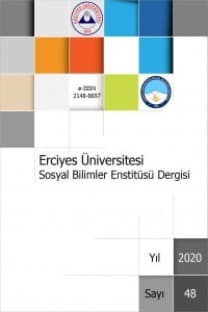19. YÜZYILDA KORE’DE BATILILAŞMA HAREKETİ VE KADININ STATÜSÜ
Ülkelerin tarihine bakıldığında modernleşme ve batılılaşma süreçleri birbirine benzer ancak Kore bu noktada farklılık gösterir. Bu farklılığı çalışmanın içeriğinde dönem tarihini gözönüne alarak açıklamaya çalıştım. Ayrıca bir toplumun modernliğini kadınlann sosyal statülerinden anlamak mümkündür. Dolayısıyla bu çalışmada batıklaşma dönemin¬deki kadınların durumlanna da kısaca yer verdim. Kore’nin batılılaşma çalışmaları 19. yüz- ylda Coson Hanedanlığı (1392~1910) nın hüküm sürdüğü yıllara dayanmaktadır. Kore batılılaşma ve modernleşme doğrultusunda politik, ekonomik, toplumsal ve kültürel olarak bir takım değişimlere uğramıştır. Kore’ye Bak’nın yeni fikirlerininin iletimi Doğu Asya da büyük politik gücü elinde bulunduran Japonya sayesinde Gabo (1894-1896) reformunun ilanı ile olmuştur. Batılılaşma dönemine Gehoagi (Aydınlanma Dönemi-1894~1910) adı verilir. Japon baskısıyla olsun ya da olmasın Kore Batı siyasetinin ve toplumunun bilincine erişmeye zorlandığı için Aydınlanma dönemi toplumda büyük bir değişim ve reforma sebep olmuştur. Bu dönem Kore kadınları için bir dönüm noktası idi. Konfüçyanizm inancı ve ataerkil yapısı nedeniyle Kore kadınlarının haklan kısıtlı idi. Misyonerlerinde etkisiyle Ay¬dınlanma Dönemiyle birlikte eğitim başta olmak üzere birçok haklara sahip oldular. Kore kadınlan, Edebiyat alanında kendilerini göstermeyi bilmişler ve kadınlar açısından dünyada olup bitenleri ve yeni fikirleri hemcinsleriyle paylamışlardır.
Anahtar Kelimeler:
Kore Aydınlanma Dönemi, Batıklaşma, Gabo Reformu, Ka¬dın Eğitimi, Kadın Yazarlar
WESTENIZATION MOVEMENT IN KOREA AND STATUS OF KOREAN WOMAN IN 19th CENTURY
When looked at the history of the countries, their processes of being modernization and westernization are similar to each other, but Korea differs from them in this point. I have tried to explain this difference, by taking its age into consideration, in the content of study. Moreover, it is possible to understand the modernity of a society from womens social statues. Thus, in this study, I have briefly mentioned the statues of the women in the period of westernization. The studies of westernizing of Korea are based on the years in which Choson dynasty (1392-1910) has reigned in 19th century. Korea, as parallel with being modern and westernized, has encountered some changes such as politic, economic, social and cultural. The transmission of the new ideas of West to Korea is formed with the Gabo Revolution (1894-1896) which owns to Japan, it a great effect political policy in East Asia. The period of westernization is called Gehoagi age (Enlightment period 1894-1910). Whether with the pressure of Japan or not, Enlightment period has caused a great chance and reform in the society because of Korea has being force to reach to the knowledge of the West of policy and society. This period was a turning point for Korea's women. Due to the Confucianism belief and its patriarchal system, Korean women's rights were restricted. Also with the missionaries' affects, they, with Enlightment period, have had many rights, especially having education right. In this period, the Korean women have achieved to show themselves in the field of literature also shared their new ideas reqarding of worlds current issues with their own sex.
Keywords:
Enlightment period of Korea, Westernization, Gabo Revolution, Women Education, Women Writers,
___
Balaman, Ali R za. (1998). Kore Tarihi ve Kültürü, Ege Üniversitesi Bas mevi, zmir,Lee, Younghee. (2002). Ideology Culture And Han, Jimoondong publishing company, Seoul,
Oh, Eunkyung. (2005). Feminist Ele tiri: 20.yy. Türk ve Kore Roman nda Kad n,
Kemal yay nlar , Ankara Co, Dongil. ( 2005). Hanguk Munhagtongsa 5, G nde Munhak Ce1gi, Ci igsanobsa ( (2005). , , )
Gang, Mangil. (1994). Goçyo s n Hanguk G nde Sa, Çangbi, ( (1994)). , ,
Gim, Honggyu. ( 1986). Hanguk Munhag y ihe, Mid msa, ( (1986). , )
Gim, Yun ik-Gim, Ucong. ( 2005). Hanguk Hyonde munhagsa (1900-1990), Hyondemunhag, ( ( 2005). (1900- ), )
Hanguk Yosong Yongu. (1999). Uri Yosong Yogsa, Çongnyonsa, ( (1999). , )
Peter, H. Lee. (2003). A History of Korean Literature, Combridge University Press,
Pak,Yonggyu. (1996). Hanguan ro gn n Coson Vangco illog, D llyok, Seoul. ( (1996). , , )
Yang, Myonghag. (1999). G nde Munhak Çögi Yosong Sosol Yongu, Ulsandehagyo
Gyoyugdehagvon Sogsa Nonmun, ( (1999). , ,)
- Yayın Aralığı: Yılda 2 Sayı
- Yayıncı: Erciyes Üniversitesi
Sayıdaki Diğer Makaleler
BEDEN EĞİTİMİ ÖĞRETMENLERİ SINIF YÖNETİMİ DAVRANIŞLARI ÖLÇEĞİ GEÇERLİLİK VE GÜVENİRLİK ÇALIŞMASI
Hüseyin ÜNLÜ, Ali Murat SÜNBÜL, Latif AYDOST
Eski Anadolu Tarihinde Frigler
ASUR TİCARET KOLONİLERİ ÇAĞINDA TİCARETİ YAPILAN MALLAR VE VERGİLER
MELİKGAZİ İLÇESİNDE PARKLARIN SINIFLANDIRILMASI VE KULLANIM VARLIĞI ANALİZİ
19. YÜZYILDA KORE’DE BATILILAŞMA HAREKETİ VE KADININ STATÜSÜ
SAM TAYLOR WOOD’UN YAPITLARINDAKİ İKON VİDEO OLGUSU ve DİSİPLİNLERARASILIK
Senuma KAYŌ’nun Japon Çeviri Edebiyatı Tarihindeki Yeri ve Çehov Çevirileri
KÜRESELLEŞME-KÜLTÜR İLİŞKİSİNİN EĞİTİM ÖRGÜTLERİNİ ETKİLEME BİÇİMLERİ (KAYSERİ İLt ÖRNEĞİ)
